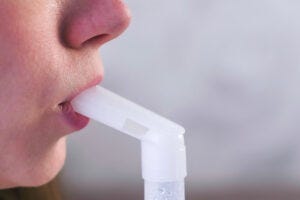October 10, 2023

Recently launched AlveoGene is looking to develop inhaled gene therapies to cure rare respiratory diseases.
Through funding from UK universities Oxford, Edinburgh, and the Harrington Discovery Institute, along with collaboration from the UK Respiratory Gene Therapy Consortium (GTC), newly minted company AlveoGene is setting its sight on curing rare respiratory diseases via inhaled gene therapies.
The firm has secured an exclusive licence to a proprietary and validated lentiviral delivery platform developed by the GTC over the last decade.

DepositPhotos/familylifestyle
The platform, called ‘IngenuiTy,’ will be used to develop therapies delivered through a nebuliser. Through repeated administration, the product will convert lung epithelial cells with high efficiency and a long duration of action.
Key features of the platform also include a scalable manufacturing process, which will allow its rapid translation through to first-in-human trials, putting AlveoGene in the position to fast-track the development of its first candidate AVG-001.
The handful of approved gene therapies and the majority of those in the clinic are delivered by injection. For patient adherence and ease of access, companies are now looking for alternative delivery mechanisms.
Recently, the US Food and Drug Administration (FDA) approved Vyjuvek (beremagene geperpavec), a redosable gene therapy gel to treat the skin condition dystrophic epidermolysis bullosa (DEB). Meanwhile, other firms like TherageniX are looking to dry powder gene therapies.
Early-stage pipeline
AlveoGene’s first candidate is AVG-001, targeting Alpha-1 antitrypsin deficiency (AATD), a rare inherited disorder that poses a genetic risk factor for progression to emphysema.
“I am truly excited to lead this new venture. The combination of pioneering science, an extensively validated platform, access to world-leading expertise […] provides a fantastic foundation for the Company,” said David Hipkiss, who has been appointed executive chair of the company.
The project is at pre-clinical stage and AlveoGene is aiming to get to clinical development over the next two to three years; the estimated revenue for the project is $1 to $3 billion, depending on how much the disease awareness and diagnosis will improve.
The pipeline includes two other products, both designed to be delivered through a nebulizer, and which will target, respectively, surfactant protein B deficiency, a rare respiratory disease affecting babies, and idiopathic pulmonary fibrosis, a serious chronic disease that impacts the lungs alveoli.
About the Author
You May Also Like




